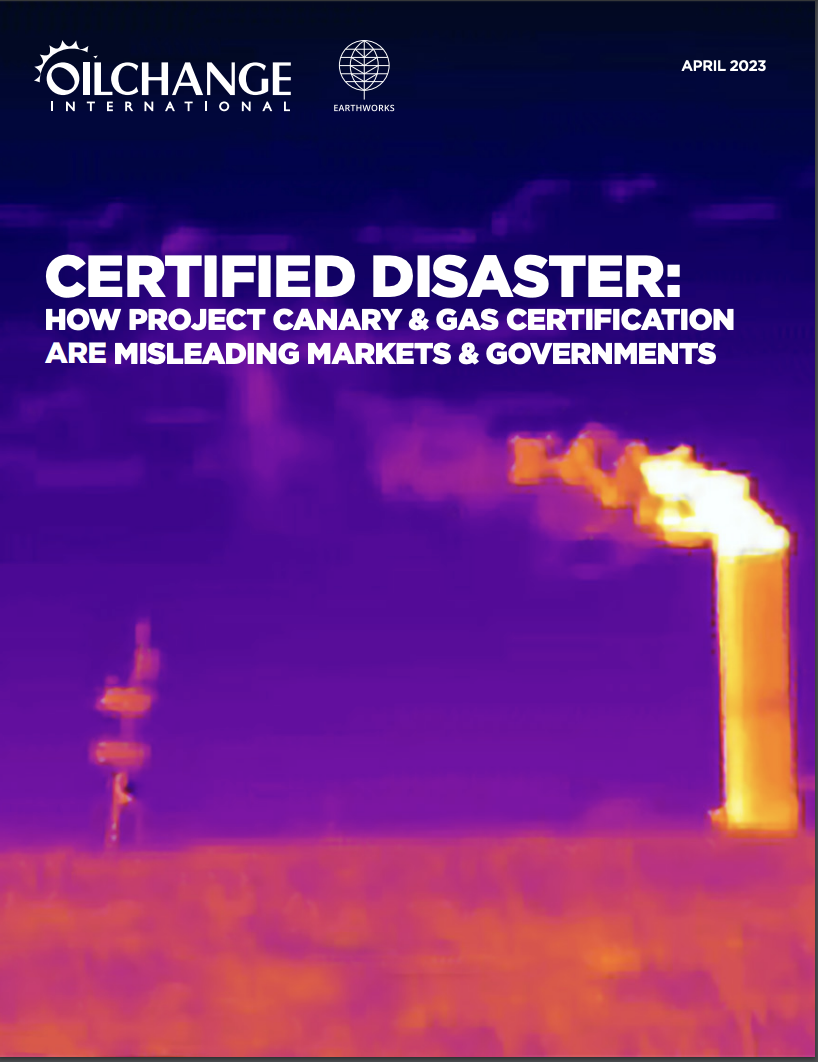In response…
Lorne Stockman, Research Director, Oil Change International, said:
“We investigated one of the primary companies gas producers pay to “certify” their fossil fuel as “clean” or “responsible” – and found nothing to support their claims. We put independent pollution monitors at sites the company claimed to track and found over 20 pollution events. The company’s monitors missed all of them. Private gas “certification” is flawed because companies have every incentive to claim they’re clean, and no repercussions when they instead pollute, poison our air, harm our health, and cause the climate crisis. It’s important our lawmakers are advocating for the government to step in, stop this scam, and regulate gas companies to clean up their mess.”
Allie Rosenbluth U.S. Program Manager, Oil Change International, said:
“Fossil fuels cause the climate crisis, pollute our air and water, and harm our health. That’s why the Biden Administration paused new approvals of gas export terminals and tasked the Department of Energy to consider whether its process accurately assesses the impacts of these projects. In response, companies may try to make the desperate case that gas is in the public interest by “certifying” their gas as “cleaner,” “responsibly sourced,” “climate safe,” or other false advertising. Our lawmakers are wise to call for a stop to this scam, and get ahead of what’s likely to be a mad scramble to greenwash gas. Only phasing out fossil fuels will solve the climate crisis and protect the health and safety of our communities.”
Caleb Heeringa, Program Director of the Gas Leaks Project, said:
“The ‘natural’ gas industry knows it has a huge methane problem, and it’s desperate to look like it’s cleaning up its act. But plugging a couple holes in a fracking well or pipeline doesn’t make methane gas ‘clean’ — it’s still a fossil fuel that warms the planet, harms nearby communities and pollutes the air in your home if you own gas appliances. Today’s letter from climate leaders in the Senate is an important step towards protecting the public from the industry’s misleading marketing of ‘natural’ gas.”
The senators wrote: “Gas certification companies currently operate in a Wild West environment.”
Washington (February 12, 2024) – Senator Edward J. Markey (D-Mass.), chair of the Environment and Public Works Subcommittee on Clean Air, Climate, and Nuclear Safety, along with Senators Jeff Merkley (D-Ore.), Sheldon Whitehouse (D-R.I.), Richard Blumenthal (D-Conn.) and Elizabeth Warren (D-Mass.), today sent a letter to Federal Trade Commission (FTC) Chair Lina M. Khan urging the Commission to investigate and crack down on misleading environmental claims by fossil fuel companies and gas certification programs. The senators call on the FTC to update its “Green Guides” to provide better guidance on the claims gas certification programs can legitimately make. The Green Guides have not been updated since 2012 and do not currently include any guidance for oil and gas marketing.
Over the past decade, the gas industry has engaged in a greenwashing campaign in which third-party “gas certifiers” evaluate methane emissions from natural gas production, often utilizing unreliable and inaccurate technologies and methodologies. Gas companies then misleadingly use these inaccurate evaluations to advertise their products as a clean bridge between fossil fuel and renewable energy and charge higher prices for the purportedly “clean” gas—costs that are usually passed on to consumers.
In their letter to Chair Khan, the senators wrote, “Gas producers sometimes publicly describe their product as ‘certified,’ ‘responsible,’ or ‘differentiated’ and market it as a climate-friendly fossil fuel. But too often, these green claims are false or misleading, as the methodology underlying them is opaque, the technology supporting them is unreliable, and the downstream climate effects of gas combustion are ignored… many utilities are using so-called ‘certified’ gas to falsely burnish their climate bona fides, and some charge premiums for gas bearing these frequently meaningless designations.”
The senators continued, “This greenwashing scheme demands an FTC investigation and the express inclusion of guidance for third-party natural gas certification regimes in revised FTC Green Guides. These steps will help prevent gas producers and certification companies from misleading and ripping off consumers, harming the environment, and hindering progress on climate change.”
False or misleading certified gas claims create a greenwashing effect that obscures the negative short- and long-term climate effects posed by methane gas. Studies measuring methane leakage have concluded that if gas leaks, even a little, it can be as bad as coal. These certification schemes have allowed the gas industry to justify continued expansion while undermining climate goals of achieving net zero greenhouse gas emissions by 2050.
To better understand how the FTC addresses false or misleading gas certification claims, the senators request answers to the following questions by March 31, 2024:
- Has the FTC examined the “certified,” “differentiated,” or “responsible” gas certification process and the clean gas claims made by the gas industry? If so, what has the Commission found? If not, will the Commission commit to investigating these claims?
- In the next iteration of the Green Guides, will the FTC include guidance expressly addressing claims about certified gas? If so, when does the FTC anticipate that guidance will be published? If not, why not?
- Does the FTC believe that the Green Guides can sufficiently address gas certification claims? Has the FTC considered commencing a rulemaking proceeding to promulgate regulations that address them? If so, what is the status of those considerations? If not, why not?

